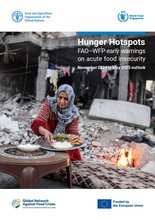
With the goal of sustainably building food security WFP focused on three pillars: i) relief – meeting urgent food needs; ii) resilience – supporting resilient livelihoods and economic activity; and iii) preparedness – improving national capacity for emergency response.
WFP’s country office performed well in both the relief and preparedness pillars of the portfolio. It worked competently and showed strong strategic responses during the crises that erupted in Gaza in 2012 and 2014. Not only did it maintain WFP’s reputation for capable logistics in the delivery of in-kind food assistance, but it also helped to build a growing reputation for competence and innovation in use of the electronic voucher modality, which was one of the portfolio’s stronger achievements. The resilience pillar was the hardest to define and deliver satisfactorily. Food assistance helped to protect livelihoods but it did not promote or rebuild them.
The evaluation made seven recommendations, including redefining the focus of WFP’s food assistance on food security and protection of livelihoods; restructuring its portfolio design; providing technical advisory services to the Palestinian Authority’s school feeding and labour-intensive public works; developing staff profiles; refining the targeting of beneficiary households; developing monitoring and analytical systems; enhancing advocacy and resource mobilization for the Nutrition Awareness Campaign; and clarifying respective roles in the field of nutrition with other United Nations agencies in the State of Palestine.



